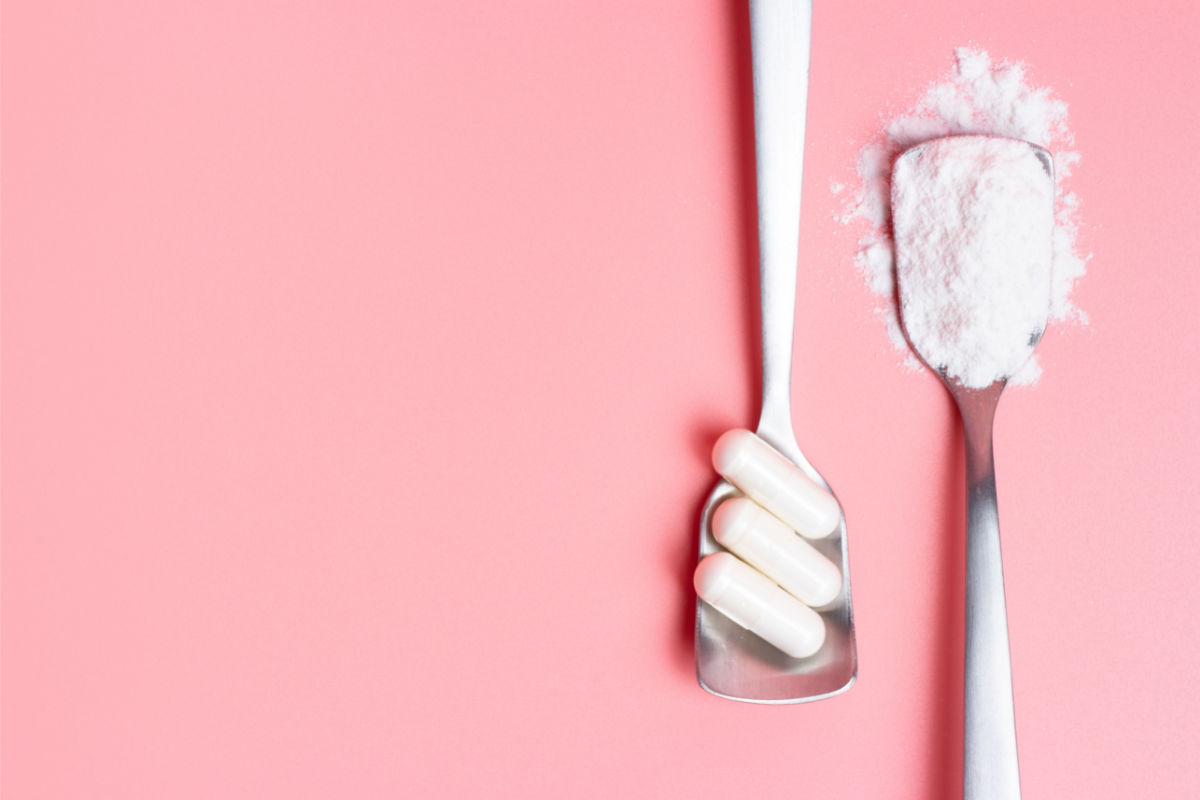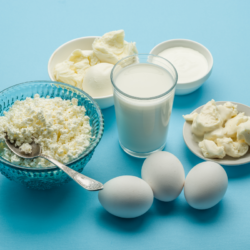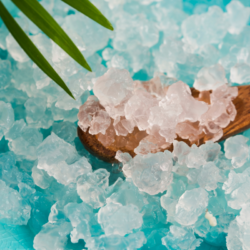Ah, creatine! This well-known natural substance sportsmen and and bodybuilding. But did you know that your brain is also a big fan of creatine? Well, brace yourself, because you’re about to find out why your brain loves creatine and how it can improve your cognitive abilities. So grab a cup of tea, make yourself comfortable and let us guide you on this exciting adventure into the heart of your grey matter.
The scoop on creatine
Before diving into the reasons why your brain is such a fan of creatine, it’s essential to understand what this intriguing substance is and how it works. In this section, we’re going to lift the veil on the mysteries of creatine, revealing its origins, how it works, and the most surprising aspects of this fascinating molecule. So get ready, because you’re about to discover the secrets creatine has to offer!
What is creatine?
Creatine is a natural substance found in our bodies and in certain foods, such as red meat and fish. It plays a crucial role in energy production, particularly in muscle cells. But surprise, surprise! Creatine also has beneficial effects on our brain.
Why does your brain love creatine? Cognitive benefits
Creatine, an amino acid naturally present in our bodies, is best known for its role in sports performance and muscle growth. However, more and more studies are showing that this molecule also has beneficial effects on our cognitive function. So let’s delve into this exciting world and discover together how creatine can improve our memory, concentration and many other aspects of our cognition.
Improved memory and concentration
Creatine boosts energy production in brain cells, which in turn improves memory and concentration. Want to stay focused at that interminable meeting? Creatine could be your ally. Who hasn’t felt that foggy brain feeling after a long day’s work? You often find yourself exhausted, unable to think clearly or make coherent decisions. This mental fatigue can become a real obstacle to remaining productive and efficient on a daily basis. Fortunately, creatine may be the solution to help you overcome this problem.
Creatine helps to reduce mental fatigue by increasing the availability of energy to brain cells. How does it work? Our brains actually use a substance called ATP (adenosine triphosphate) as a source of energy for all their activities. However, ATP reserves can be depleted quickly, especially during intense brain activity. That’s where creatine comes in!
Once ingested, creatine is converted into phosphocreatine in our bodies. Phosphocreatine is capable of rapidly regenerating ATP, which helps maintain a high level of energy for brain cells. As a result, creatine helps combat mental fatigue, giving our brains a boost of energy when we need it most.
So, by incorporating creatine into your daily routine, you could see a significant improvement in your mental stamina. Gone are the days of dragging yourself to the end of the working day! Thanks to creatine, you’ll be able to stay alert and concentrated for longer, enabling you to manage your tasks better and make the most of your free time without feeling exhausted.
Nerve cell protection
Creatine has neuroprotective properties, which means it can help protect nerve cells from damage caused by oxidative stress and other damaging factors. To better understand the importance of these properties, it is crucial to explain what oxidative stress is and how it affects our brain.
Oxidative stress is an imbalance between the production of free radicals, unstable molecules, and our body’s ability to neutralise them with antioxidants. Free radicals can damage nerve cells, causing brain dysfunction and, in the long term, neurodegenerative diseases such asAlzheimer’s or Parkinson’s.
Creatine plays a part in this process by acting as an antioxidant. It helps neutralise free radicals, protecting nerve cells from oxidative damage. Creatine also helps to stabilise cell membranes and maintain the structural integrity of nerve cells, making them less vulnerable to external attack.
Creatine also promotes energy production in brain cells, as mentioned above. This enhanced energy production mechanism allows nerve cells to better resist environmental stresses and harmful factors, such as toxins or inflammation.
How can you incorporate creatine into your life?
In this section of the article, we’ll take you step-by-step through how to incorporate creatine into your daily life to take full advantage of its benefits for the brain. Whether it’s adapting your diet or opting for supplements, we’ll look at different methods to enable you to adopt an approach that suits your lifestyle. Discover our tips for getting the most out of creatine, whether you’re a vegetarian, vegan or meat-eater. Follow us as we explore the sources of creatine and learn how to optimise your routine to improve your overall wellbeing.
Diet
Diet plays a vital role in reaping the benefits of creatine for our brains. To take full advantage of this precious molecule, it’s important to eat a varied diet rich in natural sources of creatine.
- Red meat
Red meats, such as beef, lamb and pork, are among the best sources of creatine. These foods contain significant quantities of this molecule, which helps to improve our cognitive performance. So don’t hesitate to add these meats to your menu, but be sure to follow the recommended consumption guidelines and choose quality sources.
- Fish
Fish, particularly oily fish such as salmon, mackerel and herring, are also excellent sources of creatine. Rich in omega-3 fatty acids, these fish are real allies for our brain and our general well-being. Think about incorporating these fish into your diet on a regular basis to take advantage of their benefits for your memory and concentration.
- Poultry
Poultry, such as chicken and turkey, are also an interesting source of creatine. Eating poultry will enable you to diversify your intake of this molecule while benefiting from leaner, protein-rich meat.
- For vegetarians and vegans
If you are vegetarian or vegan, you should be aware that creatine is mainly found in animal products. However, don’t worry, there are alternatives available so that you can benefit from it too. Read on in the next section to find out which creatine supplements are best suited to your lifestyle.
Food supplements
If you can’t get enough creatine from your diet, or if you want to optimise your intake of this molecule, food supplements are an effective and practical alternative. Here are a few tips on how to choose and use these supplements to best effect.
Types of supplements
Creatine monohydrate powder is the most common and best-studied form of creatine supplement. Renowned for its high quality, bioavailability and effectiveness, it is ideal for those who want to supplement their creatine intake.
Choosing a quality supplement
To reap the full benefits of creatine, it is important to choose a quality supplement. Choose reputable, certified brands that guarantee the purity and effectiveness of their products. Don’t hesitate to consult the opinions and recommendations of other users to help you make your choice.
Dosage and instructions for use
The recommended dosage for creatine supplements varies according to the individual and their goals. However, a common approach is to follow a loading phase followed by a maintenance phase. During the loading phase, consume 20 grams of creatine per day, divided into 4 doses of 5 grams each, for 5 to 7 days. For the maintenance phase, reduce your intake to 3 to 5 grams per day. Always follow the dosage recommendations on the packaging of your supplement.
Best time to take creatine
Although there is no ideal time to take creatine, some studies suggest that taking it after training may help it to be better absorbed and used by the body. You can also spread your intake throughout the day to maintain stable creatine levels in your body.
What is dry scooping?
Dry scooping’ is a trend that has taken off on social networks, particularly among fitness and bodybuilding enthusiasts. Dry scooping consists of directly consuming a food supplement powder, such as creatine or protein powder, without first mixing it with water or another liquid. In other words, you ‘swallow’ the dry powder directly with a spoon, hence the name ‘dry scooping’.
This method is often used by people who want to save time and avoid preparing a shake or drink before or after their workout. Some dry scooping enthusiasts also claim that it allows the body to absorb nutrients more quickly.
However, it’s important to note that dry scooping can present health risks. Swallowing a dry powder can lead to a false stomach, throat irritation or even suffocation. What’s more, there is no scientific evidence to show that this practice actually promotes faster absorption of nutrients.
How much creatine should I take?
The optimal dose of creatine varies according to a number of factors, such as age, weight, level of physical activity and individual goals. However, there are general recommendations on how much creatine to take to achieve safe and effective results.
For most people, it is common to follow an initial loading phase followed by a maintenance phase:
1. Loading phase: During this phase, which generally lasts 5 to 7 days, 20 grams of creatine are consumed per day, divided into 4 doses of 5 grams each. This phase rapidly saturates the creatine reserves in the muscles.
2. Maintenance phase: After the loading phase, creatine consumption is reduced to 3 to 5 grams a day to maintain creatine levels in the muscles. This phase generally lasts several weeks or months, depending on individual goals.
It should be noted that some people prefer to skip the loading phase and start directly with the maintenance phase, taking 3 to 5 grams of creatine a day. This approach is also effective, although the results may take longer to appear.
It is important to stress that creatine requirements can vary from one individual to another, and it is always advisable to consult a health professional or nutritionist before starting to take creatine supplements. These experts will be able to help you determine the optimal dose based on your specific needs and goals.
FAQs :
- Is creatine safe for the brain?
Yes, creatine is generally considered to be safe and well tolerated. However, it is always best to consult a health professional before starting any new dietary supplement.
- How long does it take to feel the effects of creatine on the brain?
The effects of creatine on the brain can vary from person to person. Some people may feel improvements within a few days, while others may take a few weeks to notice a difference.
- Does creatine cause side effects?
Creatine is generally well tolerated, but it can cause minor side effects, such as stomach cramps, diarrhoea or water retention. These side effects are generally temporary and disappear over time.
Conclusion:
Why does your brain love creatine? The answer is clear: it offers amazing benefits for cognitive function, improves memory and concentration, reduces mental fatigue and protects nerve cells. So, if you want to give your brain a boost, don’t hesitate to make creatine part of your life, whether through a suitable diet or quality supplements. But, as always, don’t forget to consult a health professional before starting any new dietary supplement. Now that you know why your brain loves creatine, it’s time to get your brain working and explore everything this magical molecule has to offer.
Read more:
- https://www.ncbi.nlm.nih.gov/pmc/articles/PMC7916590/
- https://www.ncbi.nlm.nih.gov/pmc/articles/PMC6093191/
- https://pubmed.ncbi.nlm.nih.gov/30086660/
- https://www.ncbi.nlm.nih.gov/books/NBK209321/
@soin.et.nature ✨La créatine est un acide aminé situé principalement dans les muscles de votre corps ainsi que dans le cerveau ✨ La plupart des gens consomment de la créatine par le biais des fruits de mer et de la viande rouge, mais à des niveaux bien inférieurs à ceux que l’on trouve dans les suppléments de créatine de synthèse ✨L’utilisation de créatine par voie orale peut permettre à un athlète d’effectuer plus de travail pendant ses séances, ce qui entraîne des gains plus importants en termes de force, de masse musculaire et de performance ✨#soinetnature #glycemie #diabete #diabetes #ldl #hdl #cholesterol #fatloss #cheapremedy #natureltreatmentcholesterol #naturaltreatmentdiabetes #conseil #astuce #botox #sante #avene #bioderma #antiage #acidehyaluronique #vitaminec #argireline #medecineesthetique #jeuneintermittent #bodyrecomp #recompositioncorporelle #prisedemasse #naturopathie #glutathion #sante #metabolisme #syndromemetabolique #shiitake #nhco #biocyte #naturactive #aboca #pharmacieenligne #onlinepharmacy #otc #otcdiabetes #fyp #pourtoi #creatine #whey #mass #leanmass #bulk #fitness #prisedemasse sp@eafit_officiel #PasstheGreatness





